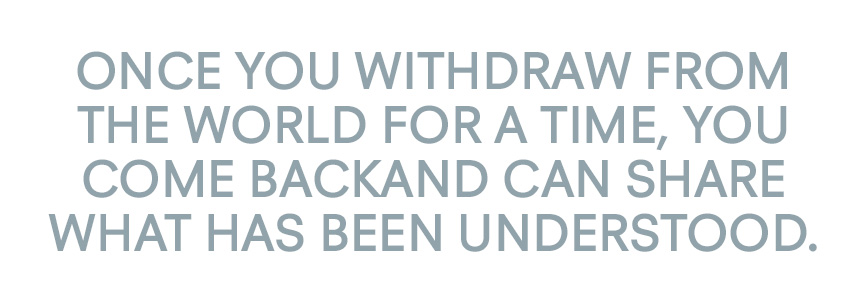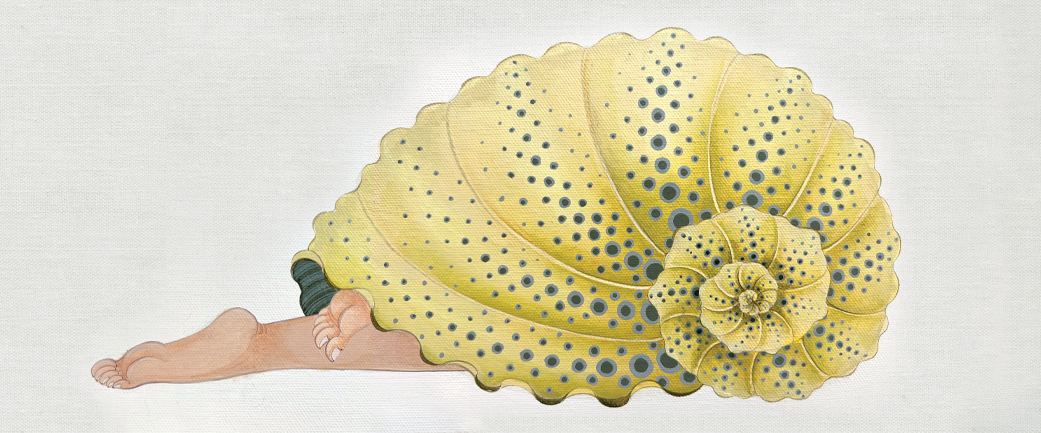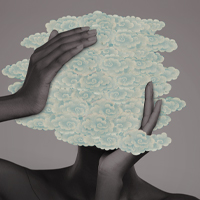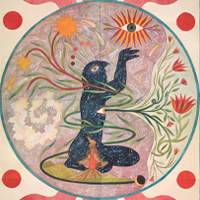
How solitude brings us into a deeper relationship with ourselves
Antonella Lumini is known as a metropolitan hermit. In 1980 at twenty-eight years old an illness changed her life. Finding the reason for her existence became so essential that she began to walk new paths, searching for balance. Her search led her to poustinia, a practice of silence and solitude derived from the Orthodox tradition of eliminating distractions so one can hear the word of God. Antonella lives an ordinary life in her house in the center of Florence that allows for periods of deep silence away and on a daily basis.
Jon Pepper and Patrizia De Libero: The theme for this issue relates to letting go of attachments and seeing things anew. Many of us may like the idea of opening ourselves to a more spiritual life, but at the same time, most people want a comfortable, material life. What is your perspective on this issue?
Antonella Lumini: We are dominated by materialist reason and impulses. This closes our perception and prevents us from investigating our potential—which is linked to our essence and forces from beyond.
I feel it is very important, the conversion of materialistic reason. In this regard quantum physics has been very helpful by demonstrating that an integral part of reality belongs to the invisible realm. So, if we remove the invisible, we cut ourselves off from a possibility and prevent feeling the stimulus to investigate unseen dimensions in life.
But there is a possibility of an underlying awakening because this invisible dimension lives inside human nature. So, from one side, nowadays there is more psychic sickness, as the soul does not find the way towards the light that yearns to reach us. And on the other hand, a vision of life based on materialistic goods and technology makes us more dependent, more attached.
This is a vicious circle. The feeling of lack produces more attachment to the material and our mask—and at the same time puts us in contact with the anguish of seeing there is not a solution in material goods. Only the spiritual dimension can break this attachment and let the mask drop.
Can you speak about the difference between looking for something instead of allowing ourselves to be found?
There are two very important passages in the Bible that speak about the beginning. In Genesis, when God creates the sky and the earth, and in the Gospel of John, the Prologue: “In the beginning was the Word, and the Word was with God, and the Word was God.”
For me, those passages are important milestones for this theme. They are about an intrinsic movement of the divine. Jewish mysticism speaks about the beginning as an ontological principle. That reminds us “to be”—so the ontologic beginning is something from which the state of being is generated. It is not a temporal principle anymore—but a principle that is always in action. It unfolds itself constantly.
In the Bible the creation is ex nihilo—a creation from nothingness. This passage from nothingness is a great mystery. Therefore, the beginning is the ontological principle that allows the constant passage from nothingness to manifestation.
Being is already manifested. And yet, it is obscure, hidden. The more consciousness expands, the more being manifests and shows itself. Consciousness removes the veil, but the veil needs to be put back, because the light is overwhelming. It can be embraced gradually as consciousness expands.
The act of creation takes us out of nothingness—it takes everything out from the invisible and gives it a form. It is important to understand that this “beginning” constantly renews itself. It is an eternal movement that allows the passage from time to eternity, to live in time but also in eternity.
So human beings, as part of this creation, have to make an effort to see the whole. This is the eschatological way, which means everything will be unveiled to the consciousness of everybody. The beauty of the human being is to see the universal consciousness. Our duty is to be conscious of this universal good in order to take part in this beauty.

Is it possible to change without needing to let go of something?
The central point of all of this is residing in the truth—to perceive what is the emptiness, to enter into the feeling of lack, and move from anguish and attachment to truth in our lives.
While in solitude we are in a deeper relationship with ourselves. This is essential because it gives us the true picture of the inner situation. Stay where you are, stay in the state of being here and now, that is how it begins. This process of descent into oneself unifies us with the process of being, with what we really are.
If we remain in the “mask” we are far away from ourselves, from being able to feel a new sense of being and belonging. We can do many spiritual exercises, but what we miss is the real breaking through. We have to enter in the courage of the truth.
Spirit is light, and truth searches light. Otherwise there is obscurity.
What is really possible for human beings in terms of opening to a different reality, a new way of being in the world?
We have to learn to live the eternity in time and taste things without possessiveness. There is no need to eliminate, deny, or dismiss anything. We have to find a centering point that can give us a right measure from things. Nothing is fundamental, and nothing is to be despised or rejected.
The more we attach, the more we identify with things. If we find our profound identity in the essence in that moment, we can taste everything. We can come to realize that there is nothing to throw away. Everything must be lived in the right way—without attachment. This is the beauty: tasting things with gratitude.
Attachment is produced by a psychic lack or unbalance. The more psyche goes towards the spirit the more attachments drop and what emerges is gratitude and a state of well-being. Then, certain things begin to stop being interesting. Things fall apart on their own, like leaves dropping from the tree. The sense of something lacking has an inscrutable depth. Inside us has been instilled the possibility to feel the lack, but also to fill the lack.
When you enter total emptiness, this lack can be filled with the celestial gift—without dependency. The spirit fills the lack in a peaceful way. But the feeling of lack is what begins everything.
Your practice of poustinia is focused on silence and solitude. What is the relationship between that and being engaged with the world as it relates to opening to a new way to live? Do we need to withdraw?
People ask me, what kind of rules do you have about this? I have only one: the balance between the inner and outer. It is not the isolation itself, going to a top of a mountain and withdrawing, but the state of being. It is living the experience, which means cultivating something inside, giving space inside to something else.
The moment we give space and time to this dimension of silence something opens, and we enter in a different relationship with life and our true essence—getting to know our shadows, our wounds, all of what we are. By seeing and listening to this silent sound, the physical sense becomes spiritualized.
Our essence is just a fragment of the divine essence. Like when we take water from a well—the bucket goes down into the water and takes a part of that whole. In the same way when we go inside of our essence we enter into the divine ocean and touch a part of that. What we understand there is mysterious and seemingly unspeakable. But because it becomes an experience, a sensitive experience, in the end it can be also spoken about.
The divine incarnates in the human and this can be shared. But it cannot be understood or manifested as just a thought. This is why we speak about poustinia “in the square” (in life). Once you withdraw from the world for a time, you come back and can share what has been understood, perceiving and listening to things differently. But unless someone practices in this moment of space and time, the danger is still to live constantly reacting to the world.
Like a plant that has very deep roots, once this practice in solitude is stable there is no need to withdraw all the time. So we always have to have two measures—within ourselves and outside—because this is where we will bring what we have found to use in the world, but not for us alone.
Compassion, mercy, all these qualities—they are like a universal way of perceiving and feeling. But they originate in the deep experience inside oneself, in silence and solitude where suffering rises. Not to escape the world, but to feel the world.
Is there anything else you’d like to share?
Love is the arrival point. Silence puts you in a state of listening, and through listening one enters a connection with the universal plan.
We have to see ourselves in this divine drawing. Death, evil, darkness—these are just possibilities in life. We do not need to be dominated by this thread. There is something beyond all of this, and we must raise our antenna to connect with what is above this— toward forces that are made of light.
But it is not easy to choose the spiritual way because of the domination of materialistic reasons. So we have to take responsibility and take a commitment to become instruments for something else. The spiritual life is something that begins for healing oneself, but in fact, it has universal consequences. It helps to bring light into the darkness.
About the Contributors
Antonella Lumini has been pursuing a path of silence and solitude for over thirty years. After studying philosophy, she devoted herself to the study of the Bible and texts on Christian spirituality. She worked at the National Central Library of Florence dealing with ancient books. Antonella participates in spirituality meetings and leads meditation groups in Florence and other Italian cities. She has published Inside the Silence (2023) and Deep Memory and Awakening (2008), among other books.
Patrizia De Libero is a native of Rome, Italy, who has studied many spiritual traditions and embraced the Gurdjieff Work since her college days. She runs Kairos Pilgrimages, an organization connecting people to sacred places. Patrizia is a yoga teacher and certified death doula, and she runs the Everything Is Life school of conscious dying and living in North America.
Jon Pepper is a former musician, book designer, and entrepreneur who has almost fifty years of experience with meditation and spiritual pursuit. He is currently a trustee of the Gurdjieff Foundation of New York.
Image Credit
Uuriintuya Dagvasambuu is a contemporary master of the Mongol Zurag painting and is widely respected for her innovations in this style. She integrates traditional Mongolian and Buddhist motifs with contemporary themes, as she chronicles the lives of women and everyday, mundane life across the seasons in her post-nomadic homeland. Dagvasambuu graduated from the Institute of Fine Arts, Mongolian University of Arts and Culture. She lives and works in Ulaanbaatar.





